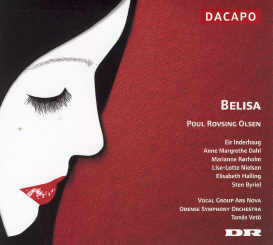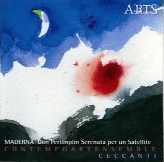Poul Rovsing Olsen: Belisa (Chamber opera 1966)
Bruno Maderna : Don Perlimplin (Radio opera 1962)

OLSEN: Belisa
Eir Inderhaug, soprano (Belisa)
Sten Byriel, bass (Don Perlimplin)
Marianne Rørholm, mezzo-soprano (Marcolfa)
Anne Margrethe Dahl, soprano (The Mother)
Elisabeth Halling & Lise-Lotte Nielsen, soprano (The Elves)
Odense Symphony Orchestra
Tamás Vetö, conductor
Vocal Group Ars Nova Da Capo
8.226013 [72 mins] When composing his music for Belisa (1966) Poul Rovsing Olsen was deeply inspired by Spanish poet Federico García Lorca's drama, "almost a libretto ready to set to music", and by the passionate and demanding character of Belisa herself. There has been at least one later chamber opera setting of this tale, which I have not heard:
THE LOVE OF DON PERLIMPLIN by Conrad Susa (premiere 1984, in a production with the San Francisco Opera Center) Synopsis: A wealthy, old bachelor is persuaded by his housekeeper to take a wife. He marries a young, lusty woman—a match that is disastrous. Perlimplin realizes that his young wife will take lovers, and he is filled with despair. At the same time, however, he has experienced love and has learned to use his imagination. He devises a plan by which, disguised as a young man in a red cape, he woos and wins Belisa. Honor, however, demands that the husband kill the wife's lover. Since they are one in the same, Perlimplin makes the ultimate sacrifice and kills himself. Through this tragic act, Belisa realizes what true love is, and she is transformed from a wanton, flighty girl to a mature woman.
Poul Rovsing Olsen (1922-82) studied in Copenhagen and then with Boulanger and Messiaen in Paris. He was a lawyer and music writer, with special ethnomusicological expertise and publications. Olsen's opera develops from stylized opera buffa into the ambiguous and surreal with an unexpected ending, and the music reflects Lorca's drama 'like a sensuous kaleidoscope with French and Oriental overtones'.
The opening scene is the wedding night of Belisa and Don Perlimplin, where the young bride takes 5 lovers in front of her decrepit groom whilst he is sound asleep. The score is deliberately stylistically diverse, but always direct and accessible, never simplistic. There are excellent parts for the eponymous heroine (lyric soprano) and the unwisely married bass. The orchestration is always deft and must be rewarding to play. There is a racy episode for two gossipy 'household spirits' which is twelve-tone, but you wouldn't guess it.
Lavish production with a fully illustrated booklet (109 pages) and full texts with parallel translations. Recommended.

BRUNO MADERNA (1920-1973)
Don Perlimplin
Serenata per un Satellite for Ensemble (1969)
Don Perlimplin (1962)
Ballata amorosa
di Federico Garcia Lorca
- translation: Vittorio Bodini
Roberto Fabbriciani (Flute) - Don Perlimplin
Marion D' Amburgo - Marcolfa and Speaker
Sonia Bergamasco - Belisa
Marcello Bartoli - Speaker
Valentina Banci - 1st Folletto
Filippo Todorov - 2nd Folletto
Aida Daile Lucche, Sandro Tani, Lucia Danesi, Marco Vanni (Sax Quartet) - Suocera
Elettroacustico: Centro Tempo Reale - Firenze
Contempoartensemble/ Mauro Ceccanti
ARTS 47692-2
In Bruno Maderna's
compressed 57 mins version of the same Lorca story as were set later in operas by Olsen and Susa the protagonist is represented by the great flautist
Roberto Fabbriciani, for whom Maderna often composed, and the mother's part is eliminated. The earliest of the three to be composed, it is musically more 'avant-garde' than Olsen's, and benefits from state-of-the-art recording in 2002, with double-tracking for Belisa's only aria and elaborate electro-acoustic treatment of the elves who comment on the action conspiratorially. The diction (spoken and sung) is excellent and the full text is provided, with translation for those without command of Italian. I found the whole thing entrancing and went back to the Olsen which has equal but quite different merits.
There is an attractive shorter work for ensemble, a 'guided improvisation' in open form with the musicicians freed to choose from a selection of fragments, but under the control of the conductor to ensure continuity and formal logic (this relates to the controlled chance techniques or "aleatory counterpoint" introduced by Lutoslawski, also in the '60s).
I strongly recommend acquisition of both the ArtsMusic Don Perlimplin and Da Capo's Belisa for an enjoyable couple of hours explorating contemporary approaches to opera during the '60s.
Maderna Works for Orchestra Vol 2
Composizione in tre tempi, for orchestra: Flute Concerto:
Aria, for voice, flute & orchestra:
Dimensioni III, for flute & orchestra:
Stele per Diotima, for orchestra
Frankfurt RSO/Tamayo
NEOS 10934 [2005/6 - midprice]
This compilation features flute and voice, with three different solo flute soloists. Maderna has a way of discovering new sounds in the orchestra; in Dimension III & Aria (for flute & voice) there are "felicitous newly discovered timbres at a generally subdued dynamic level".
The recording is good but the production mind-bogglingly awful. There are three pages of notes by A I de Benedictis, decently translated to English. We are told that in Aria the voice "interprets the meaning of the Holderlin text with exactitude - - draping its phrases over the sonic surface of the orchestra" etc. So where's that text?
But for the rest, most of the other 40 glossy multilingual pages (yes, forty) are largely redundant, duplicating excessively inclusive CVs, yet not finding space for Holderlin in any language...
Flautists, however, should buy the disc.
Peter Grahame Woolf
Other Scandinavian operas well worth exploring are the Swedish composer
Carl Unander-Scharin's
The King of Fools and Poul Ruders' The Handmaid's Tale, both on Da Capo.
|



